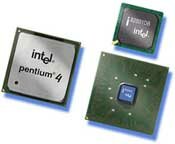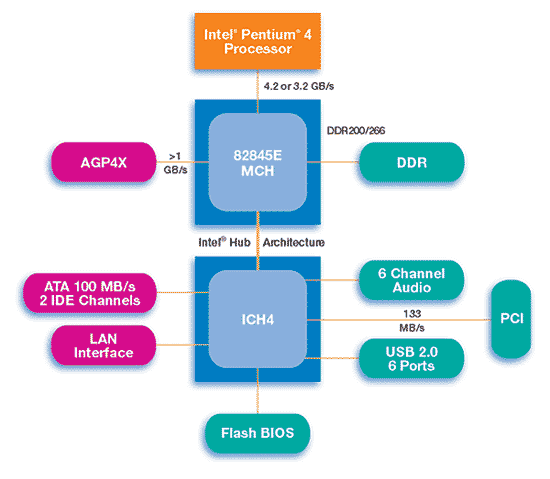|

The i845E
As an alternative to the RDRAM based 850 chipset, the 845 chipset was released to support the more common SDRAM memory types. The chipset seriously handicapped Pentium 4 performance however, so it was revamped to support DDR, while not providing the same bandwidth as RDRAM, it was cheaper, and more plentiful.
The 845 chipset went through another revision this summer though, and is now available in either the "E" or "G" flavors. Both revisions add 533FSB support (133FSB quad pumped), and the "G" adds Intel's latest graphics integrations to the mix. For the purposes of this review, we'll be focusing on the .

All of the supported features are as follows:
400 and 533MHz System Bus
Platform longevity with support for the highest CPU frequency and increases system bandwidth for greater system responsiveness.
Intel® Hub Architecture
Dedicated data paths to deliver maximum bandwidth for I/O intensive applications.
DDR200 or DDR266 SDRAM
High bandwidth DDR memory support for higher system performance based on reliable SDRAM architecture.
AGP4X interface
High-bandwidth interface for high-quality 2D, 3D, and video streams.
LAN connect interface
Flexible networking options for a range of usage models.
Alert on LAN* 2.0
Emits an alert in case of software failures or system intrusion, even when the O/S is not present or the system is suspended.
Hi-Speed USB 2.0 (6 ports)
Hi-Speed USB 2.0 offers up to 480MB/sec enabling ultrafast data transfers for demanding I/O peripherals.
Ultra ATA/100
Takes advantage of the latest industry innovations in HDD features and performance.
Intel® Application Accelerator
Software that helps accelerate boot time and application launch times.
AC'97 Controller
Excellent audio quality, with up to six channels for full surround- sound capability.
Dual DMA Audio Engines
Enable two independent audio experiences simultaneously.
Communications Network Riser Card
Allows flexibility for multiple configurations on a single card to extend USB, LAN, and audio.
Low-power sleep mode
Energy savings
PACKAGE
Intel® Pentium® 4 Processor
478 Flip Chip Pin Grid Array (FCPGA)
Intel® 845E Chipset-82845E MCH
593 Flip Chip Ball Grid Array (FCBGA)
Intel® 845G Chipset-82801DB ICH4
421 Micro Ball Grid Array (µBGA)
The revised Memory Controller Hub (MCH) adds 533FSB support (400FSB support is included as well), but it's the I/O Controller Hub (ICH4) that will probably be of most interest for some of you. You now have support for up to 6 USB 2.0 devices. With the growing popularity of USB 2.0, this may be a handy feature to have for the near future. Because this is integrated on-chip, it will help reduce motherboard costs as a 3rd party USB 2.0 controller isn't needed anymore.
Keep in mind that only PC1600 and PC2100 is officially supported by the MCH. PC2700 will work though, but not at it's full speed.
Bluetooth
Not part of the i845 featureset, MSI has included Bluetooth support for users who have, or planning to hop on the Bluetooth bandwagon. For those of you not in the know, Bluetooth is set to replace those infrared sensors on many devices, such as laptops, PDAs, and cell phones to name a few. Unlike infrared, you are not limited by line of sight.
  
Click to enlarge
The first part of MSI's Bluetooth kit is the transmitting card/module. Although the module doesn't plug into a PCI slot, you will lose a PCI slot (specifically, PCI #5) as the module needs to plug into a set of pins located on in front of the PCI slot. The antenna then is installed in the module. Assuming you have a secondary PC with USB support, you plug the transceiving key into the USB and now you have wireless connectivity. It's nice that MSI includes the tools, as not many people will have Bluetooth enabled devices, but wireless networking is something I'm sure a lot of people would want.
In theory, the Bluetooth enabled PCs should be able to transfer data at about 125KB/s. In reality, we were not able to acheive that level of speed. I transfered our local copy of our website from my primary computer, to my secondary, located on the floor above me, and only managed about 60KB/s. Not nearly as fast as our ethernet connection, but a lot faster than waiting for my files to burn to CD, then moving them to the next computer.
Anyhow, Bluetooth isn't really exclusive to just networking, but sending faxes, printing, PDA syncronizing, and a whole lot more. It hasn't exactly taken the home community by storm, but it's still an emerging technology that may well find itself in our living rooms in the future.
Previous Page - Introduction
Next Page - The Board
|
